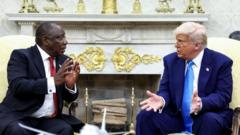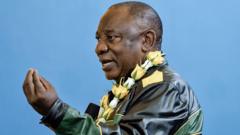In South Africa, the discourse surrounding President Trump's recent claims about white farmers facing persecution is stirring significant controversy, revealing deeper societal wounds associated with apartheid.
Trump’s Controversial Refugee Claims Ignite Responses from South Africans

Trump’s Controversial Refugee Claims Ignite Responses from South Africans
As President Trump discusses white South African farmers as victims, many Black South Africans express outrage and skepticism over the implications of his statements.
Mandla Dube, a Black farmer from Pretoria, shared his distress as he listened to President Trump, who has positioned white South Africans as refugees due to alleged persecution. Dube reflected on his own harrowing experiences with crime, emphasizing that Trump's narrative does not represent the reality for many, particularly Black citizens. He stated, “It just makes you go, ‘Geez, how about some of us who’ve been attacked, who haven’t left this country and who are still here?’”
Trump announced in February his plans to create a fast-tracked resettlement process for white South Africans, which has since been met with widespread disbelief and anger in South Africa. For many, the portrayal of Afrikaners, descendants of the colonialists tied to a legacy of oppression, as victims contradicts the lived experiences of those who endured brutal apartheid policies.
This juxtaposition of perspectives showcases the ongoing divide within South African society and has sparked a mix of sarcasm and humor in public discourse. While some South Africans utilize humor to cope with the frustration, the underlying sentiment reveals a collective anger concerning the nation's complex historical context and current inequality.
As debates evolve surrounding Trump's rhetoric, many assert the importance of acknowledging and addressing the inequalities that linger in post-apartheid South Africa.
Trump announced in February his plans to create a fast-tracked resettlement process for white South Africans, which has since been met with widespread disbelief and anger in South Africa. For many, the portrayal of Afrikaners, descendants of the colonialists tied to a legacy of oppression, as victims contradicts the lived experiences of those who endured brutal apartheid policies.
This juxtaposition of perspectives showcases the ongoing divide within South African society and has sparked a mix of sarcasm and humor in public discourse. While some South Africans utilize humor to cope with the frustration, the underlying sentiment reveals a collective anger concerning the nation's complex historical context and current inequality.
As debates evolve surrounding Trump's rhetoric, many assert the importance of acknowledging and addressing the inequalities that linger in post-apartheid South Africa.




















